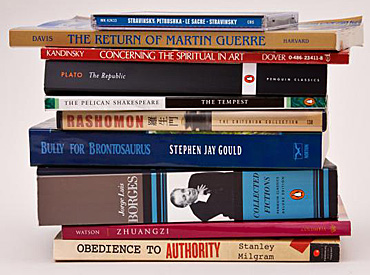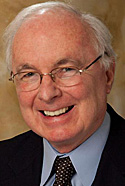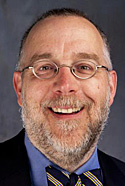Lawrence University is joining three other national liberal arts colleges in a collaborative effort to identify best practices in common core curricula and communicate the significant benefits of liberal education to a wider audience.
 Supported by a $243,000 grant from the New York City-based Teagle Foundation, Lawrence will partner with Pennsylvania’s Ursinus College, Tennessee’s Rhodes College and The College of the Holy Cross in Massachusetts to examine how core courses help students develop the judgment needed in their careers and in their lives. The 30-month-long project—“Gateways to Liberal Education”—aims to invigorate core curricula in American colleges.
Supported by a $243,000 grant from the New York City-based Teagle Foundation, Lawrence will partner with Pennsylvania’s Ursinus College, Tennessee’s Rhodes College and The College of the Holy Cross in Massachusetts to examine how core courses help students develop the judgment needed in their careers and in their lives. The 30-month-long project—“Gateways to Liberal Education”—aims to invigorate core curricula in American colleges.
Beginning this summer, a series of four conferences will be conducted with faculty from each of the four schools to discuss ways in which a common course or syllabus identifies essential texts, skills and experiences that prepare students for fulfilling careers and lives as responsible citizens.
The conferences also will explore benefits to faculty teaching such courses, how common inquiry can bond faculty and students and how colleges can assess their accomplishments.
Subsequent conferences will be open to faculty from other schools interested in incorporating similar pedagogies and courses in their general education programs.
The Gateways to Liberal Education project is expected to produce a volume of essays directed at both academia and prospective students and their parents that highlights the importance of this education model.

“The goal of liberal education is to develop the human capacity for critical thought, judgment and creativity and to infuse that capacity with a passion for effective action in the contemporary world,” said David Burrows, provost and dean of the faculty at Lawrence. “This goal has never been more important than it is right now. We must look to liberal arts colleges to lead the way to a bright future for our society. This grant will help ensure that we find that way.”
Four Common Core Programs
The four-school consortium involved in the project each offer its own common core program. Lawrence’s multidisciplinary Freshman Studies program exposes students to enduring works in the humanities, fine arts, social and natural sciences to foster students’ abilities to think critically, write effectively and speak persuasively.
Initiated in 1945, Freshman Studies spans two terms of a three-term academic year and strives to awaken first-year students to the excitement of liberal learning. Faculty from all disciplines teach the course in sections of approximately 15 students.
“The Teagle project will have many benefits for Lawrence,” said Timothy Spurgin, associate professor of English and the campus’ project leader on the grant. “It will give us an opportunity to share what we’ve learned from decades of experience with Freshman Studies and also help us to learn from other schools and their programs.”
Ursinus, which will serve as the lead institution on the project, features the Common Intellectual Experience, a two-semester common syllabus core course required of all first-year students. The program uses texts to engage students in discussing three perennial questions: How should one live? What does it mean to be human? What is the universe and my place in it?
Rhodes provides a comprehensive experience that links a rigorous academic program with experiential learning in the community. The college’s commitment to a values-based liberal arts education is based on 12 “foundation” requirements that emphasize students’ integrating their in-class work with research and experiential learning outside the classroom.
Holy Cross’ Montserrat program enrolls all first-year students in small, intensive, full-year seminars that are grouped into five thematic clusters, each of which incorporates interdisciplinary and experiential learning opportunities through shared texts, lectures, field trips and other events. Each student is enrolled in a small, yearlong seminar that explores a specific topic while developing critical thinking, writing and communication skills.

“None of these other programs is exactly like our Freshman Studies, but there are enough similarities to make the idea of collaboration very exciting,” said Spurgin. “If this collaboration does nothing more than to remind us all of why we do these things—why we aren’t giving into outside pressures and embracing the latest fads—it will have accomplished a lot.”
Joining Spurgin as Lawrence faculty representatives on the project are Elizabeth Carlson, associate professor of art history and Lori Hilt, assistant professor of psychology.
The “Gateways to Liberal Education” grant aligns with The Teagle Foundation’s interest in seeking and supporting courses and programs that equip students to deal effectively with questions of meaning, value and responsibility that will persist throughout their lives.
About Lawrence University
Founded in 1847, Lawrence University uniquely integrates a college of liberal arts and sciences with a nationally recognized conservatory of music, both devoted exclusively to undergraduate education. It was selected for inclusion in the Fiske Guide to Colleges 2013 and the book “Colleges That Change Lives: 40 Schools That Will Change the Way You Think About College.” Individualized learning, the development of multiple interests and community engagement are central to the Lawrence experience. Lawrence draws its 1,500 students from nearly every state and more than 50 countries. Follow Lawrence on Facebook.